Hakutaka
The Hakutaka (はくたか) is a high-speed shinkansen train service jointly operated by East Japan Railway Company (JR East) and West Japan Railway Company (JR West) between Tokyo and Kanazawa on the Hokuriku Shinkansen line in Japan. The shinkansen service was introduced on 14 March 2015, but the name was first used for a limited express service operated by Japanese National Railways (JNR) from 1965 until 1982, and later by JR West and Hokuetsu Express between 1997 and March 2015.
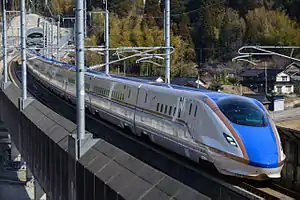 A JR West W7 series train on the Hokuriku Shinkansen | |
| Overview | |
|---|---|
| Service type | Shinkansen |
| Status | Operational |
| Locale | Japan |
| First service | 1 October 1965 (Limited express) 14 March 2015 (Shinkansen) |
| Current operator(s) | JR East/JR West |
| Former operator(s) | JNR, Hokuetsu Express |
| Route | |
| Start | Tokyo |
| End | Kanazawa |
| Service frequency | 15 return workings daily |
| Line(s) used | Hokuriku Shinkansen |
| On-board services | |
| Class(es) | Gran Class + Green + Ordinary |
| Technical | |
| Rolling stock | E7 series, W7 series |
| Track gauge | 1,435 mm (4 ft 8 1⁄2 in) |
| Electrification | 25 kV AC, 50/60 Hz overhead |
| Operating speed | 260 km/h (160 mph) |
Service outline
As of 14 March 2015, 14 return Hakutaka services operate daily between Tokyo and Kanazawa, with one additional return working daily between Nagano and Kanazawa.[1] Trains operate at a maximum speed of 260 km/h (160 mph).[1]
Hakutaka services stop at the following stations. Not all trains stop at stations marked with an asterisk.[1]
Rolling stock
- E7 series 12-car sets based at Nagano Depot, since 14 March 2015
- W7 series 12-car sets based at Hakusan Depot, since 14 March 2015
Hakutaka services are operated using JR East E7 series and JR West W7 series 12-car train sets based at Nagano and Hakusan depots respectively.[1]
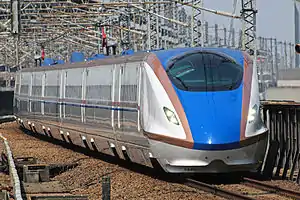 A JR East E7 series train
A JR East E7 series train
Pre-shinkansen
- 485 series EMUs
- 681 series EMUs owned by JR West
- 681-2000 series EMUs owned by Hokuetsu Express
- 683-8000 series EMUs owned by Hokuetsu Express
Limited express services from March 1997 until March 2015 were operated with 6- or 9-car (6+3-car) 681 series or 683-8000 series EMU trains owned by JR West or Hokuetsu Express.[2] Green (first class) car accommodation was provided in car 1.[3]
 A JR West 681 series, February 2015
A JR West 681 series, February 2015 A Hokuetsu Express 681-2000 series, September 2014
A Hokuetsu Express 681-2000 series, September 2014 A Hokuetsu Express 683-8000 series, July 2007
A Hokuetsu Express 683-8000 series, July 2007
Formations
Hakutaka shinkansen services use 12-car JR East E7 series and JR West W7 series trainsets, formed as follows, with car 1 at the Tokyo (southern) end. Cars 1 to 10 are ordinary-class cars with 2+3 seating, car 11 is a "Green" car with 2+2 seating, and car 12 is a "Gran Class" car with 2+1 seating. All cars are no-smoking.[4]
| Car No. | 1 | 2 | 3 | 4 | 5 | 6 | 7 | 8 | 9 | 10 | 11 | 12 |
|---|---|---|---|---|---|---|---|---|---|---|---|---|
| Accommodation | Non-reserved | Non-reserved | Non-reserved | Non-reserved | Reserved | Reserved | Reserved | Reserved | Reserved | Reserved | Green | Gran Class |
| Facilities | Toilets | Toilets, phone | Toilets | Wheelchair space, accessible toilet, phone | Toilets | Wheelchair space, accessible toilet | Toilets |
History
October 1965 – November 1982
The Hakutaka service was first introduced on 1 October 1965 as a limited express service operating between Ueno in Tokyo and Kanazawa via Naoetsu. This was discontinued from 15 November 1982.[5]
March 1997 – March 2015
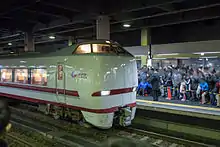
The Hakutaka name was reinstated from 23 March 1997 for use on new limited express services jointly operated by JR West and Hokuetsu Express connecting Kanazawa with Echigo-Yuzawa on the Joetsu Shinkansen via the newly built Hokuetsu Express Hokuhoku Line, operating at a maximum speed of 160 km/h (100 mph).[2] Hakutaka services operated at approximately hourly intervals between Kanazawa and Echigo-Yuzawa, with one return service daily starting and terminating at Fukui. One return working daily operated between Wakura-Onsen and Echigo-Yuzawa. Services stopped at the following stations.[3]
(Fukui) – Kanazawa – Takaoka – Toyama – Uozu – Itoigawa – Naoetsu – Echigo-Yuzawa
The last Hakutaka limited express service ran on 13 March 2015, replaced by new high-speed shinkansen services from the start of the revised timetable introduced the following day.[6]
Shinkansen Hakutaka, (March 2015 – )
From 14 March 2015, the name Hakutaka was transferred to new shinkansen services operating between Tokyo and Kanazawa following the opening of the Hokuriku Shinkansen beyond Nagano.
References
- 長野~金沢のあらまし [Outline of Nagano to Kanazawa]. Tetsudō Daiya Jōhō Magazine (in Japanese). Vol. 44 no. 371. Japan: Kōtsū Shimbun. March 2015. pp. 12–14.
- JR新幹線&特急列車ファイル [JR Shinkansen & Limited Express Train File]. Japan: Kōtsū Shimbun. 2008. p. 38. ISBN 978-4-330-00608-6.
- JR Timetable, October 2013 issue, pp. 123–124
- JR Timetable. Japan: Kotsu Shimbunsha. February 2015. EAN 4910053110259.
- 列車名鑑1995 [Train Name Directory 1995]. Japan: Railway Journal. August 1995. p. 128.
- 北陸新幹線開業で2つの特急廃止 [2 limited express services scrapped with opening of Hokuriku Shinkansen]. NHK News (in Japanese). Japan. 13 March 2015. Archived from the original on 15 March 2015. Retrieved 13 March 2015.
External links
| Wikimedia Commons has media related to Hakutaka (train). |
- JR West Hakutaka train information (in Japanese)
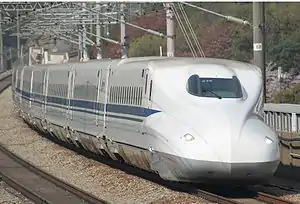
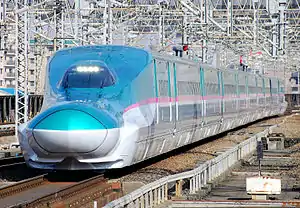
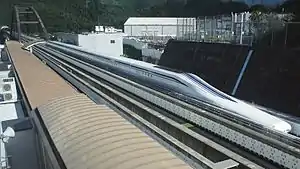
.svg.png.webp)
.svg.png.webp)